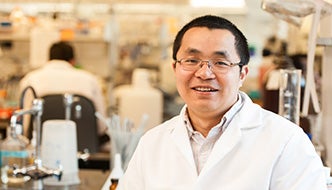
Leo Wan
Leo Q. Wan, assistant professor of biomedical engineering, has won a five-year, $2.4 million New Innovator Award from the National Institutes of Health (NIH) to support his pioneering research in left-right asymmetry of the cell in embryonic development.
This prestigious award is reserved for early-stage investigators who propose highly innovative approaches to major challenges in biomedical and behavioral research. Nationwide, only 50 scientists received the award in 2014.
The New Innovator Award is the latest honor for Wan, who also has been named a Pew Scholar in the Biomedical Sciences and has won a Faculty Early Career Development Award (CAREER) from the National Science Foundation.
“Dr. Wan is among the most promising, talented young researchers in the field of biotechnology and biomedical engineering, and we congratulate him on this latest, much-deserved recognition,” said Deepak Vashishth, director of the Rensselaer Center for Biotechnology and Interdisciplinary Studies (CBIS). “His research and its potential clinical implications exemplify the trailblazing work underway at CBIS.”
Wan’s research focuses on chirality—also known as handedness or left-right asymmetry—an important feature in the development of multicellular organisms. In humans, for example, asymmetry is evident in the positioning of organs in the body.
Dr. Wan is among the most promising, talented young researchers in the field of biotechnology and biomedical engineering, and we congratulate him on this latest, much-deserved recognition. His research and its potential clinical implications exemplify the trailblazing work underway at CBIS.”—Deepak Vashishth
Defects in chirality occur in more than one in 8,000 live births. Wan’s goal is to uncover the rules that govern left-right asymmetry in tissues and organs during development and, ultimately, to better understand genetic diseases and birth defects. He uses embryonic stem cell culture to mimic the cells at various stages of embryonic tissue development. He also employs micro-fabrication, live cell imaging, molecular assay, traction force measurement, and high-throughput screening to illustrate the biophysical and biochemical mechanisms involved in the formation of chiral structures.

Wan uses embryonic stem cell culture to mimic the cells at various stages of embryonic tissue development.
The NIH New Innovator Award was established in 2007 to stimulate highly innovative research and support promising new investigators. The award is part of the NIH High-Risk High-Reward Research Program “to encourage creative, outside-the-box thinkers to pursue exciting and innovative ideas about biomedical research.”
“This is the NIH’s most prestigious award for early investigators,” said Juergen Hahn, professor and head of the Department of Biomedical Engineering. “It is an extraordinary honor for Dr. Wan, the department, the School of Engineering—and for Rensselaer.”
Wan has a bachelor’s degree in theoretical and applied mechanics and a master’s degree in fluid mechanics from the University of Science and Technology of China. He earned his doctoral degree in biomedical engineering from Columbia University and served as a postdoctoral researcher there before joining Rensselaer in 2011. In addition to his NIH, NSF, and Pew awards, he has been recognized with an American Heart Association Scientist Development Grant, March of Dimes Basil O’Connor Starter Scholar Research Award, the Cellular and Molecular Bioengineering Conference Rising Star from the Biomedical Engineering Society, and Young Investigator Award from the Frontiers in Bioengineering Workshop.


